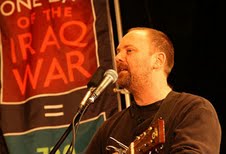The 'everyone has a right to their opinion' defense that Berkeley Law employs to protect John Yoo is easy to discount, but his 'theories' have had serious consequences when applied as law. When the former deputy assistant attorney general ruled specific torture techniques 'legal,' real people suffered.
Despite repudiation by peers, and rejection of his work at the Office of Legal Counsel by the same (Bush) regime that hired him to legalize the unconscionable, Yoo continues to be given credence as an authority on executive privilege to kill. His name is no longer attached only to torture (Yoo also played a key role in supporting illegal government surveillance and use of U.S. troops against people on American soil, advocates for militarization of outer space, and stumps for a lethal strike on Iran). The 'torture professor' now volunteers cover for assassination by the current executioner-in-chief Barack Obama, in an article for the New York Law School Review:
Targeted Killings After
9/11
It would be a huge mistake to think John Yoo is alone in his arguments. He is not some lone wolf with wacky ideas but is influenced by and representative of a school of thinking that has come from the so-called 'best law schools' of this country: Harvard, Yale, Berkeley. Yoo's veneer of legitimacy should have been stripped away years ago. It's not too late. The crime of murder has no statute of limitations.
"the moral risk of torture is not so different from the moral
risk of targeted killing. Indeed, the moral risk of torture provides a template
for the moral risk of targeted killing. What was introduced as an option of
last resort becomes the option of first resort, then the only option. Sullivan
always understood that torture was a temptation, and that the day would come
when it was applied not in emergency, "ticking-clock" situations, but as a
matter of routine. Well, that day has come, only now with targeted killing,
where the option of first resort meets the court of no appeal -- Tom Junod



